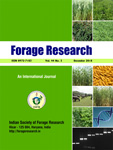MEGHA VERMA AND GULAB PANDOVE*
Department of Microbiology, Punjab Agricultural University, Ludhiana-141004 (Punjab), India
School of Organic Farming, Punjab Agricultural University, Ludhiana-141004 (Punjab), India
*(e-mail : gpandove@pau.edu)
(Received : 10 December 2023; Accepted : 30 December 2023)
SUMMARY
Drought stress is one of the most significant factors affecting agricultural lands and reducing crop production. Among the fodder crops, oats are largely grown for fodder and grain as they are a good source of fibres, proteins and minerals. Being high in energy, it provides high-quality feed for livestock. However, oats are susceptible to drought due to high rate of transpiration that may influences its morphological and physiological characteristics.In the present investigation, the plant growth-promoting bacteria i.e. Burkholderia seminalis, Azotobacter sp., Bacillus thaonhiensis, Stenotrophomonas maltophilia alone and in different combinations have been explored in augmenting the drought tolerance (5, 10, 15 and 20 % PEG) in oat seedlings via seed bio-priming with the liquid bacterial inoculant of aforesaid PGPB under in-vitro conditions.It was observed that the treatment T11: B. seminalis+ S. maltophilia holds a great potential to mitigate drought stress by showing maximum improvement in the germination percentage, germination speed, mean germination time, shoot and root length as compared to the unprimed seeds. Moreover, they are organic, safe and cost-effective and maintains the productivity of the soil. Hence, the study encourages that bio- priming of oats seeds with PGPB can overrule the pernicious effect of water deficit to enhance the growth of oats.
Key words: Livestock, drought Stress, liquid bacterial inoculants, bio-priming

